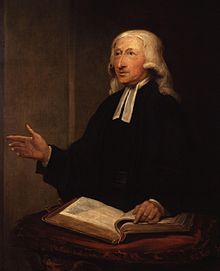What difference does this distinction make for doing theology as a Wesleyan?
Introduction: Wesley contributed to every part of mission activities. He was a pioneer of the ecumenical movement. Many traditions developed his folk theology. He bypasses the classical disjunctions between the Roman and protestant extremes. The most important person in the revival of the eighteen century. A great evangelist, reformer, and theologian. As Wesleyan theologians, we have a great heritage of ministry and responsibility as well.
Wesleyans should uphold Church theology: theology arises from the freedom and responsibility of the Christian community to inquire about its faith in God. Wesleyan theology is church theology, not sectarianism. Wesley followed the foundational work of reformers. Wesley, as a mentor, leads us into a biblical and vital concept of holiness. For any group, organized or informal, to call itself “holiness” imposes the responsibility and great care needs to be taken, that holiness should not become implicitly or explicitly merely parochial heresy divisive. And it should not be self-glorification and neglect of others. We should understand holiness in its full-orbed biblical meaning “Christian”. Paul says, “if any man has not the spirit of Christ, he is none of his”, Roman 8:9. To be a churchman, not sectarian in spirit Wesley leads us to transcend divisions and establishes oneness with all “the larger body of Christ”.
Wesleyan theology to be committed to the Gospel: theology exists to keep alive the whole gospel that alone can bring unity without loss of enriching diversity, a community without loss of personal or cultural integrity, and peace without a compromise of justice. Theology must not ask what is a true gospel. But what is a whole gospel? What is the breadth and length and height and depth” of the love of God in Christ, Eph 3:18-19. The proclamation of the gospel should transform the lives of individuals in personal and social contexts.
Wesleyans should bring theology into a common language: Wesleyans must interpret the Christian message in new situations and concepts and images that are understandable to people in their situations. The gospel was shrunken into formulas and Wesley flung it fresh in the air once more in the speech of the common man. And a man’s spirit responded, leapt at the message and made whole as they comprehended it.
Wesleyans should address social concerns: theology should bring Christian light on contemporary issues, for the theologians should learn what is the contemporary problem. Wesleyans need to engage in cross-disciplinary interchange. How holiness relates to medical issues, and practitioners like medical doctors, psychologists, and psychiatrists. Where do drugs solve the problems of depression, aggression, and crime? Social scientists, anthropologists, educators, and politicians are really serious about social transformation. Is the state taking care of the poor? How computer culture is affecting human life? Our theology should put light on these contemporary issues.
Conclusion: the theological position is taken as a Wesleyan. We must be moved from the area of debate in the home, community, marketplace and the personal life of an individual. We need to write solid theology, worth reading, fresh, vibrant, anointed, biblical, deeply meaningful theology, and pay the price for the scholarship needed for this.
https://chatgptfy.com/humix/video/6fba0469d14fbbd439ff829e938ca748ae1414f61f7ea94e268bc07ab78f285d
